Mendeley alternatives
Mendeley is used to manage and share research papers and generate bibliographies for scholarly articles. It brings your research to life, so you can make an impact on tomorrow. Search over 100 million cross-publisher articles and counting. Allows to work in different locations with identical desktop and web versions, insert citations in Word seamlessly while writing. The best Mendeley alternatives are: Zotero, EndNote, RefWorks, Papers, Citavi, Paperpile, JabRef, Google Scholar
Here are the latest news about Mendeley:
17.01.24. Mendeley adds new shortcuts, Unsorted Collection
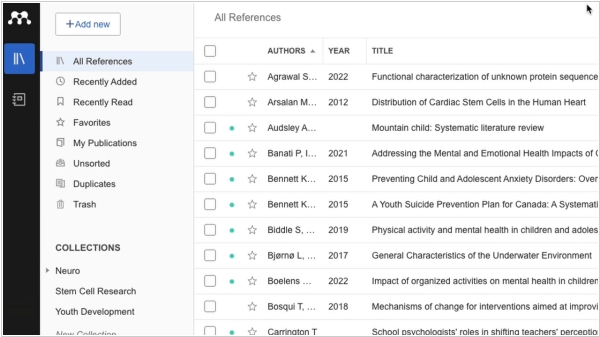
Scientific paper management software Mendeley has released new version that features few keyboard shortcuts to help users better navigate Mendeley Reference Manager. Another new feature - is Unsorted Collection. When you have a large library, it can be hard to keep track of what collection a reference belongs to, and even harder to know whether a reference belongs to a collection at all. Which is why Mendeley Reference Manager has added a new smart collection that contains all references that do not belong to a user collection. Just like with the ‘All References’ smart collection, users can now drag and drop references from any folder, hard drive, or external storage into their user collections in Mendeley Reference Manager. Besides in the new version you can customise your library experience; whether you want to see as much information as possible, or you prefer a summarised view, users can now resize their table columns to their preferences.
2023. Mendeley Cite adds footnote citation styles
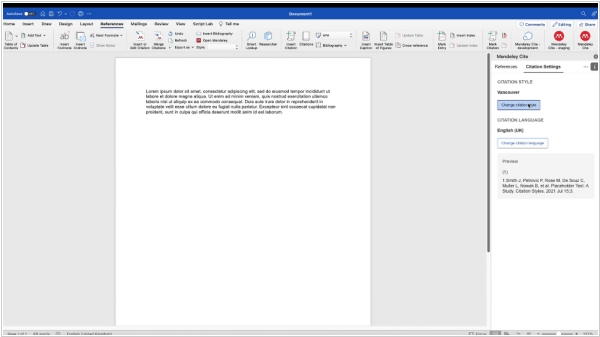
Mendeley Cite users have always had the capability to include in-text citations in their documents, but now, the functionality to insert footnote citations has been added, enhancing the citing process. The seamless integration between Mendeley Cite and Mendeley Reference Manager facilitates a smoother research writing experience. Citations play a crucial role in acknowledging academic contributions and fostering collaboration within the scholarly community. However, managing numerous references, especially when working on lengthy projects like a thesis, can be daunting. This is where Mendeley Cite steps in, simplifying the citing process significantly. To insert footnote citations, open the application and access Citation Settings, then choose Change citation style and select the references you wish to include and insert them by choosing 'insert # citations' in the pop-up at the bottom of the add-in, or insert a single citation by clicking the 'insert citation' button below the chosen reference.
2021. Reference Management software Mendeley mobile app for Android and iOS is retired

Mendeley developers have decided to withdraw lesser used mobile app from service to focus on those products that are used by more of the Mendeley Community. The app has been withdrawn from the App Store and Google Play. While some researchers indeed used the native Mendeley mobile apps, unfortunately overall usage figures showed that this feature does not support the majority of Mendeley users. Having discontinued the mobile app the developers will now focus on the solutions that the majority of the suite users value most. This includes making improvements to Mendeley Reference Manager, Mendeley Cite and Mendeley Web Importer. In order to continue the use of their Mendeley library, app users are advised to sync their library to the cloud in advance. Users can then access their library on Mendeley Reference Manager web or desktop application.
2020. Mendeley Web Library is changing to the new Mendeley Reference Manager
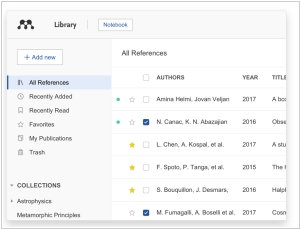
Mendeley's Web Libraries have now been migrated to the new Mendeley Reference Manager, which provides a cloud-based library that automatically syncs your changes, making them instantly accessible across devices, locations, and Mendeley tools like the desktop app and Mendeley Cite. The appearance and functionality of Mendeley Reference Manager online and desktop versions are identical, enabling you to switch between the two versions seamlessly. Moreover, offline mode allows you to continue working regardless of your location, with the assurance that changes to your library will auto-sync when you are back online. The new Mendeley Reference Manager also includes additional features and functionality that make managing references even easier, including the Mendeley Notebook, which helps you organize your notes and highlights from multiple PDFs in one place. Additionally, the desktop version of the new Mendeley Reference Manager is available for download.
2020. Mendeley has introduced new Web Importer
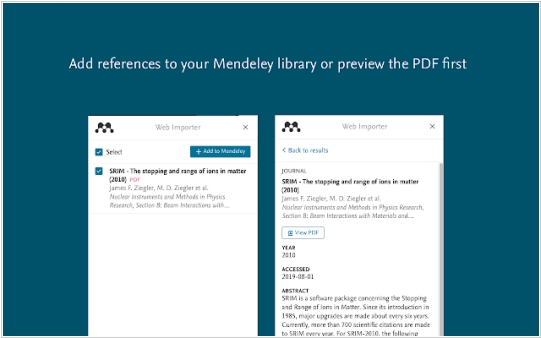
Academic Paper Management software Mendeley has released an updated version of its Web Importer tool. The refreshed design and new features are now available for both Google Chrome and Firefox. The latest version has been rebuilt to ensure reliable referencing and uploading to users' Mendeley library. Additionally, users can continue with other tasks while PDF uploads are in progress. Even if the window is closed or tabs are switched, the tool can continue uploading PDFs. Users can now preview the full text of a PDF before adding it to their Mendeley library by selecting 'View PDF' in the interface. This opens the PDF within Elsevier's enhanced PDF reader, which offers navigational shortcuts and clickable elements to the full text. The new interface of Mendeley Web Importer is more user-friendly, making it easier to add references directly to your collections and groups in the Mendeley library. The tool now also remembers your last selected collection, which saves you time.
2019. Mendeley has added note-taking feature
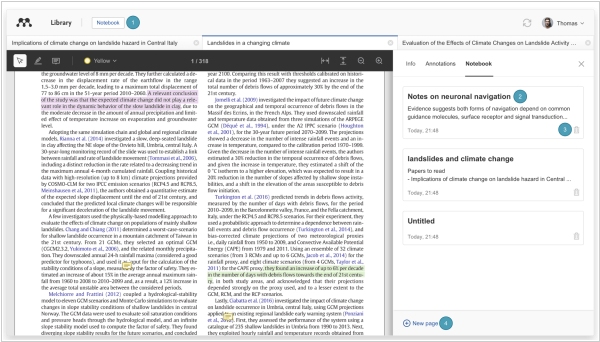
Mendeley has recently introduced a new feature called Mendeley Notebook, which serves as a note-taking tool. This tool provides a working space where users can keep their thoughts in one place, making it easy to collect highlights from multiple PDFs and add their own comments. You can add highlights from as many PDFs as you want to your Notebook. Researchers have expressed their desire to have highlights and annotations associated with the PDF, but since they often read multiple PDFs simultaneously, they wanted a way to consolidate their notes in one place. With Mendeley Notebook, users can now achieve this goal.
2017. Mendeley adds sweet citation management on Windows

The new tool Mendeley Cite allows users to cite references and create a bibliography using Office 365. This feature was previously available with Mendeley's citation plugin, but now it can be accessed through Office 365. Unlike the previous version, you don't need to use Mendeley Desktop to use Mendeley Cite. Instead, the add-in is loaded with your cloud library, allowing you to seamlessly switch between applications while citing references. Although Microsoft Word has a limited number of citation styles, users can install additional styles from BibWord. However, it's important to note that Word's citation system is not the same as the one used by Mendeley Desktop. If both systems are used in the same document, it will result in two sets of citations and two bibliographies. This feature is only available on Windows for Word 2010 and above.
2016. Mendeley enables colored annotations

Mendeley now allows users to annotate PDF articles in eight different colors, enabling the creation of a rainbow of annotations and sticky notes. In addition to this feature, other changes have been made to the reference manager to enhance the annotation experience. Menus will appear when texts or annotations are selected, making the process quicker and more intuitive. Furthermore, organizing documents in the Web Library has become easier with the ability to Drag 'n' Drop documents and folders into other folders. These features are now available in the latest version of Mendeley (iOS 2.90, Desktop 1.16, Android 1.8.2). If you can't see these features, ensure that you have restarted the application while connected to the internet and that you have the latest version of Mendeley.
2015. Mendeley Data allows to get DOI online

There is a growing trend in the scientific community to utilize research data more effectively. With funding bodies and governments now requiring that all research outcomes be made publicly available, researchers are seeking ways to publish, share and provide access to their data to other researchers. The new online Mendeley Data repository has been developed to support this movement. It offers a platform where researchers can upload their raw research data and assign it a unique identifier (a versioned DOI), thus making the research citable. This feature is explained in more detail in the Mendeley Data FAQs. In addition, the platform offers the ability to link research datasets to partnering journal websites such as ScienceDirect, Cellpress, and others to come, which allows readers to easily navigate from a research article to the underlying data, while the dataset links back to the article.
2015. Mendeley is launching Recently Read feature

Mendeley has introduced a new feature called "Recently Read" to enhance the user experience across devices. This feature automatically saves the reading position for the 20 most recently read PDFs, allowing users to seamlessly continue reading on any device. For instance, if a user starts reading an article on their desktop computer, they can continue reading it on their tablet or phone without losing their place. This feature is available for Mendeley Desktop (v1.14) on Win/Mac/Linux and iOS (v2.6). The company plans to implement this feature on Mendeley for Android and Web Library in the near future. In addition to Recently Read, the latest update also includes high-quality DOI lookups and full-screen tabs on MacOS.
17.01.24. Mendeley adds new shortcuts, Unsorted Collection

Scientific paper management software Mendeley has released new version that features few keyboard shortcuts to help users better navigate Mendeley Reference Manager. Another new feature - is Unsorted Collection. When you have a large library, it can be hard to keep track of what collection a reference belongs to, and even harder to know whether a reference belongs to a collection at all. Which is why Mendeley Reference Manager has added a new smart collection that contains all references that do not belong to a user collection. Just like with the ‘All References’ smart collection, users can now drag and drop references from any folder, hard drive, or external storage into their user collections in Mendeley Reference Manager. Besides in the new version you can customise your library experience; whether you want to see as much information as possible, or you prefer a summarised view, users can now resize their table columns to their preferences.
2023. Mendeley Cite adds footnote citation styles

Mendeley Cite users have always had the capability to include in-text citations in their documents, but now, the functionality to insert footnote citations has been added, enhancing the citing process. The seamless integration between Mendeley Cite and Mendeley Reference Manager facilitates a smoother research writing experience. Citations play a crucial role in acknowledging academic contributions and fostering collaboration within the scholarly community. However, managing numerous references, especially when working on lengthy projects like a thesis, can be daunting. This is where Mendeley Cite steps in, simplifying the citing process significantly. To insert footnote citations, open the application and access Citation Settings, then choose Change citation style and select the references you wish to include and insert them by choosing 'insert # citations' in the pop-up at the bottom of the add-in, or insert a single citation by clicking the 'insert citation' button below the chosen reference.
2021. Reference Management software Mendeley mobile app for Android and iOS is retired

Mendeley developers have decided to withdraw lesser used mobile app from service to focus on those products that are used by more of the Mendeley Community. The app has been withdrawn from the App Store and Google Play. While some researchers indeed used the native Mendeley mobile apps, unfortunately overall usage figures showed that this feature does not support the majority of Mendeley users. Having discontinued the mobile app the developers will now focus on the solutions that the majority of the suite users value most. This includes making improvements to Mendeley Reference Manager, Mendeley Cite and Mendeley Web Importer. In order to continue the use of their Mendeley library, app users are advised to sync their library to the cloud in advance. Users can then access their library on Mendeley Reference Manager web or desktop application.
2020. Mendeley Web Library is changing to the new Mendeley Reference Manager

Mendeley's Web Libraries have now been migrated to the new Mendeley Reference Manager, which provides a cloud-based library that automatically syncs your changes, making them instantly accessible across devices, locations, and Mendeley tools like the desktop app and Mendeley Cite. The appearance and functionality of Mendeley Reference Manager online and desktop versions are identical, enabling you to switch between the two versions seamlessly. Moreover, offline mode allows you to continue working regardless of your location, with the assurance that changes to your library will auto-sync when you are back online. The new Mendeley Reference Manager also includes additional features and functionality that make managing references even easier, including the Mendeley Notebook, which helps you organize your notes and highlights from multiple PDFs in one place. Additionally, the desktop version of the new Mendeley Reference Manager is available for download.
2020. Mendeley has introduced new Web Importer

Academic Paper Management software Mendeley has released an updated version of its Web Importer tool. The refreshed design and new features are now available for both Google Chrome and Firefox. The latest version has been rebuilt to ensure reliable referencing and uploading to users' Mendeley library. Additionally, users can continue with other tasks while PDF uploads are in progress. Even if the window is closed or tabs are switched, the tool can continue uploading PDFs. Users can now preview the full text of a PDF before adding it to their Mendeley library by selecting 'View PDF' in the interface. This opens the PDF within Elsevier's enhanced PDF reader, which offers navigational shortcuts and clickable elements to the full text. The new interface of Mendeley Web Importer is more user-friendly, making it easier to add references directly to your collections and groups in the Mendeley library. The tool now also remembers your last selected collection, which saves you time.
2019. Mendeley has added note-taking feature

Mendeley has recently introduced a new feature called Mendeley Notebook, which serves as a note-taking tool. This tool provides a working space where users can keep their thoughts in one place, making it easy to collect highlights from multiple PDFs and add their own comments. You can add highlights from as many PDFs as you want to your Notebook. Researchers have expressed their desire to have highlights and annotations associated with the PDF, but since they often read multiple PDFs simultaneously, they wanted a way to consolidate their notes in one place. With Mendeley Notebook, users can now achieve this goal.
2017. Mendeley adds sweet citation management on Windows

The new tool Mendeley Cite allows users to cite references and create a bibliography using Office 365. This feature was previously available with Mendeley's citation plugin, but now it can be accessed through Office 365. Unlike the previous version, you don't need to use Mendeley Desktop to use Mendeley Cite. Instead, the add-in is loaded with your cloud library, allowing you to seamlessly switch between applications while citing references. Although Microsoft Word has a limited number of citation styles, users can install additional styles from BibWord. However, it's important to note that Word's citation system is not the same as the one used by Mendeley Desktop. If both systems are used in the same document, it will result in two sets of citations and two bibliographies. This feature is only available on Windows for Word 2010 and above.
2016. Mendeley enables colored annotations

Mendeley now allows users to annotate PDF articles in eight different colors, enabling the creation of a rainbow of annotations and sticky notes. In addition to this feature, other changes have been made to the reference manager to enhance the annotation experience. Menus will appear when texts or annotations are selected, making the process quicker and more intuitive. Furthermore, organizing documents in the Web Library has become easier with the ability to Drag 'n' Drop documents and folders into other folders. These features are now available in the latest version of Mendeley (iOS 2.90, Desktop 1.16, Android 1.8.2). If you can't see these features, ensure that you have restarted the application while connected to the internet and that you have the latest version of Mendeley.
2015. Mendeley Data allows to get DOI online

There is a growing trend in the scientific community to utilize research data more effectively. With funding bodies and governments now requiring that all research outcomes be made publicly available, researchers are seeking ways to publish, share and provide access to their data to other researchers. The new online Mendeley Data repository has been developed to support this movement. It offers a platform where researchers can upload their raw research data and assign it a unique identifier (a versioned DOI), thus making the research citable. This feature is explained in more detail in the Mendeley Data FAQs. In addition, the platform offers the ability to link research datasets to partnering journal websites such as ScienceDirect, Cellpress, and others to come, which allows readers to easily navigate from a research article to the underlying data, while the dataset links back to the article.
2015. Mendeley is launching Recently Read feature

Mendeley has introduced a new feature called "Recently Read" to enhance the user experience across devices. This feature automatically saves the reading position for the 20 most recently read PDFs, allowing users to seamlessly continue reading on any device. For instance, if a user starts reading an article on their desktop computer, they can continue reading it on their tablet or phone without losing their place. This feature is available for Mendeley Desktop (v1.14) on Win/Mac/Linux and iOS (v2.6). The company plans to implement this feature on Mendeley for Android and Web Library in the near future. In addition to Recently Read, the latest update also includes high-quality DOI lookups and full-screen tabs on MacOS.
Add comment

